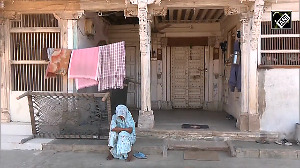
It's hard to find ministers who don't bow to party pressures. Hans Raj Bhardwaj has been an exception.
The federal minister of law would be the first to admit that he is not as brilliant a lawyer as, say, Kapil Sibal. Nor does he count himself as an expert on constitutional law of the level of Fali Nariman, for example.
But what makes him a good law minister is sound, solid common sense. And what makes him a good United Progressive Alliance law minister is his blunt, no-nonsense style and his ready admission that he would have been nothing in politics but for the 'affection and trust of the Nehru-Gandhi family.'
The Manmohan Singh government has seen three major legal controversies in the past one month: the Jharkhand conundrum; the ITC ordinance and subsequent settlement of a revenue case that has been in litigation for more than two decades; and the current controversy over affidavits filed by the government in the Kargil procurement case.
Bhardwaj has parried one for the government, fended off another, and managed the third. If it had not been for him and his capacity to absorb 'agony', the government would have been humiliated and pilloried at least three times.
The virtual judiciary versus legislature confrontation that nearly cost the law minister his job tops the list. When the Jharkhand elections were over, Shibu Soren was quickly sworn in as chief minister and given one month to prove his majority.
Complete coverage: The 2005 Jharkhand assembly election
Outraged National Democratic Alliance leaders paraded their legislators before President A P J Abdul Kalam to tell the world the Centre was collaborating in helping a minority government stay on in power.
When the Supreme Court asked the assembly to advance the trial of strength, the House was repeatedly stalled. The chief minister said the Speaker was unable to create the conditions for him to hold a show of strength.
On that basis, the chief minister was on the verge of manipulating the Centre into letting him stay in government for another couple of days so that he get more time to placate and cajole legislators into siding with him.
From the day the election results came, Bhardwaj was of the view the Opposition should be permitted to form the government. But this was Jharkhand, he was told, where the Naxalite threat was palpable and it was crucial that the Congress form a government.
Bhardwaj stood aside and watched the slippery manouvres of the so-called managers to form a government in Ranchi for whom flouting the court-directed deadline for the floor test was no big deal.
As the government lurched from one adjournment of Parliament to another, the prime minister asked him for counsel. Bhardwaj growled out his advice in pithy, clear terms.
The court had asked the Speaker to hold a trial of strength by a certain date. If the chief minister was unable to prove his majority, why was the United Progressive Alliance stretching and straining with sticky hands to keep the chief minister's chair?
The pressure on Bhardwaj was enormous. He was charged with being anti-Congress, and favouring the Opposition. Colleagues accused him of undermining them. He stood his ground. Artificial pressures were created that warned of a judiciary-legislature clash.
If the government had let politics dictate the course of events in Jharkhand, there is no telling what might have happened. But it was Bhardwaj's refusal to be swept off his feet and commonsense that dictated events -- a Cabinet meeting was called, a decision taken and conveyed to the governor and Soren's resignation secured. The whole thing took only a couple of hours but at the end of it, the government came out of the crisis with its dignity intact.
All this devotion to civil rights is a bit odd when you consider Bhardwaj's antecedents: his father was one of Jawaharlal Nehru's secretaries who died when Bhardwaj was studying law. Bent double with the responsibility of his entire family, he became a lawyer in Tis Hazari (courts), going on to become a senior public prosecutor in the high court in 1971.
Bhardwaj was Sanjay Gandhi's lawyer and the two came really close when the Janata Party government came to power in 1977 and began prosecuting the Gandhi family. He became the Gandhi family's legal advisor on almost every issue -- whether it was filing the papers for the Gandhis -- from Indira, to Sanjay to Rajiv, to Sonia and now Rahul -- or fighting cases on their behalf.
You could argue with him over this, but he stuck by the Gandhis in their darkest days. He defended Sanjay Gandhi during the Emergency but never made him a commercial proposition like others who profited by their association with him.
The family responded with respect and affection. He was made Rajya Sabha MP (this is his fourth term) though he had no base, no charismatic public appeal, no particular talent for public speaking -- only the trust of the Gandhis.
Bhardwaj was one person who was made minister in the P V Narasimha Rao regime (he became law minister in 1992 when Vijaya Bhaskara Reddy became chief minister of Andhra Pradesh) on Sonia Gandhi's recommendation.
He has risen from humble beginnings, has seen hard times, and knows the value of having his feet on the ground. He can afford to be blunt because he has nothing to lose, no constituency to pamper and protect.
This helped him steer the government through the Jharkhand crisis and also helped it retain its balance in dealing with ITC. Put simply, the ITC and the government had a tax dispute that the court awarded in favour of ITC, but recommended they resolve through a settlement.
The finance minister, who is possessive about every rupee that he feels should be in the treasury, decided to take recourse to a measure that exists in the statute but is rarely used -- an ordinance that allows the government to recover all the tax arrears retrospectively.
When Bhardwaj's advice was sought, he told the government that while this instrument did exist on the statute, the matter should be resolved rather than litigated.
Few know that it was Planning Commission Deputy Chairman Montek Singh Ahluwalia who pointed out the ludicrousness of the situation -- on the one hand, India was touting itself as a liberalised economy and, on the other, the government was legally empowered to collect money through Gestapo-like means.
Bhardwaj agreed and so did the prime minister. That is how the ITC settlement happened. And that's how Enron is going to be settled -- in the next few weeks, if the Group of Ministers that he is presiding over has its way.
The latest controversy over two affidavits filed by the ministry of defence over Kargil procurements -- one supposedly exonerating former defence minister George Fernandes and the other implicating him -- has its origins in politics rather than law.
Complete coverage: The Great Defence Scandal
Bhardwaj is clear that it is the interests of law that he has to serve. So if the Phukan Committee report requires to be laid in the House, it will be laid. But he is a firm believer in the theory that the mills of law grind slowly but grind exceeding small. And that's how he thinks justice will be done.
H R Bhardwaj photograph: Rajya Sabha
Design: Rahil Shaikh







 © 2025
© 2025